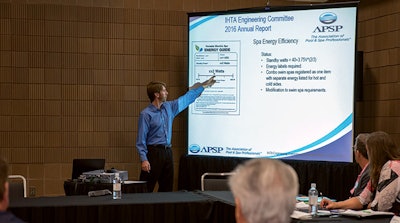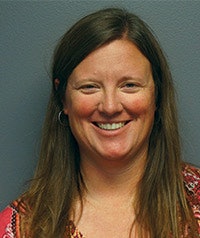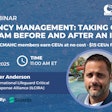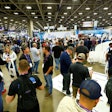
Last April, after a winter of heavy snowfall in the Sierras and a soggy spring, Governor Jerry Brown declared an end to the drought emergency that had crippled California for four years.
"Thank God for the rain," says Mike Dunn, executive vice president for Watkins Wellness in Vista, Calif., and member of the Strategic Leadership Team of the International Hot Tub Association of APSP. "Over the last few years, we've fought battle after battle over the drought. Cities would say, 'We're going to put a ban on selling pools and hot tubs.' Well, that's the kind of thing that puts people out of business, and we are constantly having to fight against that."
Last year, the IHTA of APSP lobbied lawmakers in California, trying to dispel the notion that the backyard water industry was a significant water waster. "We created content showing how pools and spas are not a big part of the problem; we sent people to city council meetings. It took an incredible amount of time and money," Dunn says. "It's better now, but it will come up again, and we'll be there to fight it."
According to Dunn, these backyard water battles are but one of the fronts the group and its dedicated volunteers and find themselves fighting all over United States and beyond. It all takes time and money, both in critically short supply given the hot tub group's limited resources. Dunn and his colleagues on the Strategic Leadership Team are happy to serve, and appreciate the annual dues paid by industry stakeholders. It's just that he wishes there were broader participation.
Dunn thinks many dealers are in the dark about how much the Association does for the industry. And he's more than happy to educate everyone about the IHTA of APSP's efforts, stressing that while lobbying understandably gets most of the attention, the group is also involved in improving industry education and licensing, and conducting invaluable research of consumer attitudes and buying habits.
RELATED: APSP And IHTA Join Forces
Number Crunching
 Kristin Woiteshek, chair of the Strategic Leadership Team and general manager for Nordic Hot Tubs, Grand Rapid, Mich.
Kristin Woiteshek, chair of the Strategic Leadership Team and general manager for Nordic Hot Tubs, Grand Rapid, Mich.
Kristin Woiteshek, chair of the Strategic Leadership Team and general manager for Nordic Hot Tubs, Grand Rapids, Mich., agrees that industry protection is and will always be paramount. However, she also takes special interest in IHTA of APSP's industry and consumer research, the former having roots in the old Hot Tub Council.
"We had been working on research for about three years," she says. "It was always hard to come up with a plan for what the statistic program was really going to be, though. Were we going to count based on the number of people a tub held? Or the type of sheet used, whether acrylic or polyethylene? We weren't sure. We just knew that everybody wanted statistics, and that they didn't want to share sales data with competitors or give up trade secrets."
Then, in 2014, the IHTA of APSP settled on some guidelines and hired Vault Consulting, a third-party accounting firm, to solicit, collect and analyze the data.
"It is Vault who actually reaches out to the manufacturers, and the manufacturers reply with numbers, so there are no names attached," Woiteshek says. "It's highly confidential, and everything goes straight to Vault. We defined five categories based on price points, and then three different geographical regions — the United States, Canada and all exports."
 Mike Dunn, executive vice president for Watkins Wellness in Vista, Calif., and member of the Strategic Leadership Team
Mike Dunn, executive vice president for Watkins Wellness in Vista, Calif., and member of the Strategic Leadership Team
Dunn, who chaired the Hot Tub Council during one of its earlier efforts at collecting sales data from manufacturers, is excited about the data the group has been able to amass. It gives Watkins Wellness reliable sales figures by which to benchmark the company's performance year to year. There's an added benefit to his customers, too.
"I can speak more intelligently because of it," he explains. "If one of my dealers calls me and asks how the market is doing, I can say, 'Well, it varies by geography, but we feel the market last year was up by five percent.' And I don't have to ballpark it or just guess. I've got empirical data. I won't give them the data, but I will tell them what I know. And I think it helps them."
The sales figures are shared only with participants, who get a report back a few weeks after sending their sales figures to Vault.
"No one besides Vault ever sees the individual data," Dunn says. "I report every quarter. The report we get is very specific, and very useful in that it's broken into those price points, and further broken down geographically."
Woiteshek estimates that the survey is capturing 85 percent of the overall market, and says the Strategic Leadership Team is working to recruit more participants in order to get an even clearer picture of the industry's health.
"I think the biggest thing is the spirit of cooperation," Woiteshek says. "Yes, we are all competitors, and we're all selling hot tubs into the same market, but I think people recognize that we're stronger together, and that if we don't share some of our resources and information, then our industry as a whole, which was obviously hit really hard in 2007 and 2008, will never come back."
The IHTA of APSP also conducted consumer research through Gallup, which followed a successful survey the consumer-research giant did of potential pool buyers a few years back. The information it gleaned will help the industry craft messages that leverage the things customers find appealing about the products and address issues that stand in the way of sales.
"The survey targeted real-life buyers," Woiteshek says. "They're people who have the discretionary funds, some of whom are currently looking and others who have never looked for a hot tub.
"That's where a lot of positive marketing for our industry is going to come from. We want to turn it from a situation where a customer could take or leave a hot tub to one where he or she has simply got to have one. We're still seen as a luxury product by some, but we're making strides every year." The hope is that those steady strides become bigger bounds as barriers to ownership are targeted and eliminated.
Education In Case Of Legislation
Educating consumers about the benefits of hot tub ownership is certainly a good idea, but educating people in the industry itself is equally important, according to Mike McCague, who chairs the IHTA of APSP's engineering committee when he's not working at Watkins Wellness as senior chemical engineer. ("At Watkins I spend 75 percent of my time doing regulatory compliance and the other 75 percent doing regular engineering projects for the company," he quips. Mike is a busy and funny guy.)
RELATED: APSP/IHTA Works to Align Int'l Spa Standards
"APSP already has a fully-fledged training program for Certified Hot Tub Technicians," McCague says. "What we did was go through it and edit and add content to the hot tub training program so it's more focused on the technicians and doesn't include things that, say, only a dealer or service owner would need. Technicians don't have to worry about certain registrations, or about having certain placards on their vans, and things like that. So we streamlined it, and also updated the language to reflect the latest technology in service."
According to Dunn, revamping the Certified Hot Tub Technician materials and program are at the forefront of the group's efforts right now, and the work is very nearly complete. The reason for the emphasis, he says, circles back to IHTA of APSP's primary purpose — protecting the industry.
"There are a handful of states that are requiring some sort of certification or license for hot tub technicians to practice," he explains. "What would the industry do if that requirement came through on a wide scale and we weren't prepared?
"Soon the IHTA of APSP will have a new program that you can send your techs through for online training and certification. Then, if you take that down to the city where they've established that requirement, you'll be in compliance. What if we didn't have any of that?"
Money Matters
Whether it's the work done on the certification program; or volunteers traveling to government meetings in Eureka, Eugene or even Europe; or cooperating with research and accounting firms to collect and interpret data, none of it would get done without the tireless work volunteers like Dunn, McCague and Woiteshek and the financial backing provided by dues-paying APSP members.
"It's hard for people to see the value in all of this, except when it's not there," Dunn says. "I've been in this industry for 38 years and I know it's important to pay dues and volunteer my time for the association.
"If I can cut to the chase and talk to the retailers, I'd say, 'For $599 a year you can be a member of APSP. Fifty bucks a month. They may say, 'I just don't see the value in that.' 'Let me ask you: What would be the cost of losing just one, single sale because of a regulatory issue? A lot more than $599.'"
Dunn and McCague point to one such proposal the IHTA of APSP defeated that saved thousands of sales but garnered little publicity. There was the proposal a few years ago to require a rebar bonding grid in concrete patios holding hot tubs. If it passed, hot tub salespeople would have to tell prospects to jackhammer perfectly good concrete to comply with a bad law.
"We had to fight that code and get it changed, because that's just not necessary," Dunn says. "I could go on and on. Just ask Mike McCague. The number of things we're tracking right now would make your head spin."
Woiteshek says it'd keep you up at night.
And McCague says it's all in a day's work. Make that a long day's work.
Jennifer Hatfield, APSP's director of government affairs, understands a long day's work. She is responsible for monitoring both the hot tub and pool legislative and regulation arenas. She works hand-in-hand with the IHTA of APSP. "We leverage our regulatory tracking system to enable the hot water segment to monitor those issues that impact their business. There's a lot more activity than people think and we need to be on top of any issue that emerges."
"I've literally gotten 500 email alerts during the first half of the year about legislative activity that has at least some remote association with recreational water, and we have to monitor them and decide when we have to take action," McCague says. For example, he cites a storm that started brewing in Europe that would have made huge waves on this side of the Atlantic.
"There's a push there to prevent finger and limb entrapment in the pool industry, mainly for children," he says. "Well, a hot tub has 50 holes in it! So we had to work closely with regulators to get consensus language that was safe for the consumer but also practical for the industry. If this proposal had passed without our input, it would have required millions of dollars in retooling by the manufacturers and only two years to get it done."
Who's Responsible?
In the end, many dealers simply don't feel it's their responsibility to guard against that kind of unnecessary regulation, to train and certify their technicians and to conduct industry research. They're content to leave it to the manufacturers. Woiteshek says that while it's true most manufacturers are willing to do that heavy lifting, it is still in a dealer's best interest to pitch in and get involved in the IHTA of APSP.
"You need to understand what's happening and be a part of it," she says. "There's just so much that goes on, and it changes so fast. You've got to stay in the loop.
"Some dealers are involved, and others think none of this is important for them. But it is. It's the same deal for everyone, and we're all in the same boat."
Membership Has Its PrivilegesMike McCague, senior chemical engineer for Watkins Wellness, on the value of getting involved with APSP: "Beyond the value of doing something good for the industry, I think being on the committee makes it so you can have a voice for your business, your product, your technology. For example, if your company does something a certain way and that way is not allowed by certain language, being on the committee you can say, 'Hold on a sec. We also need to consider this.' You'll also get firsthand information about what's going on in the industry, so you can make rapid, important business decisions based on what's coming down the pike before it hits. I think another element that's important is that we take individual cases. It's not just the big things like water and energy that we're working with the states. Say a customer has a problem with a local municipality and says, 'Hey, I can't sell spas here.' Maybe it's Master, Arctic or Jacuzzi, but we as an industry committee will discuss it, draft letters on their behalf. Those are direct services to participants right down to their customers, their dealers. Personally I really enjoy working with all the different people. It's a really nice group of men and women on the committee, and people are very helpful. There's a little bit of travel involved, too, and I don't mind that!" |





































